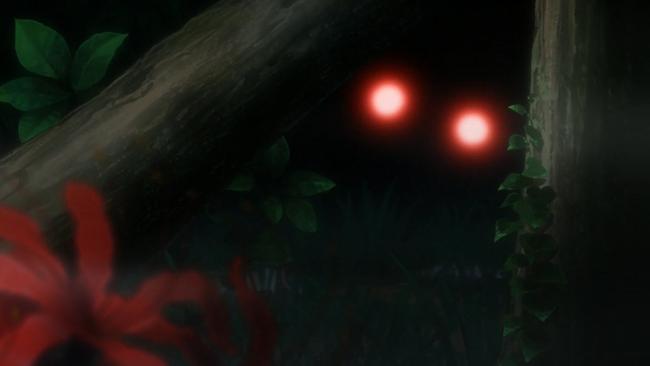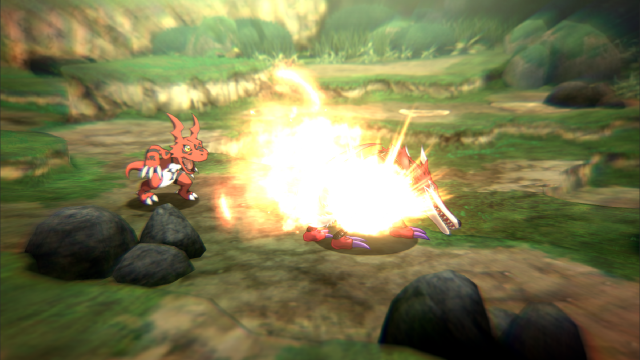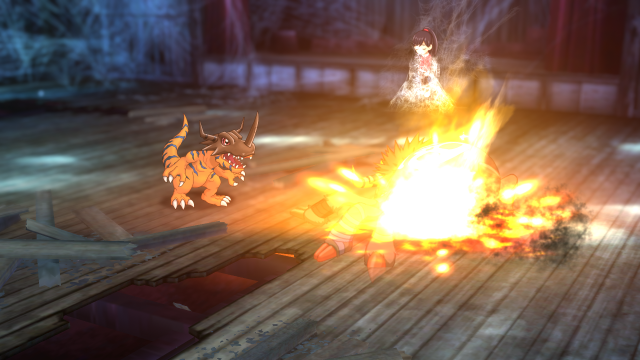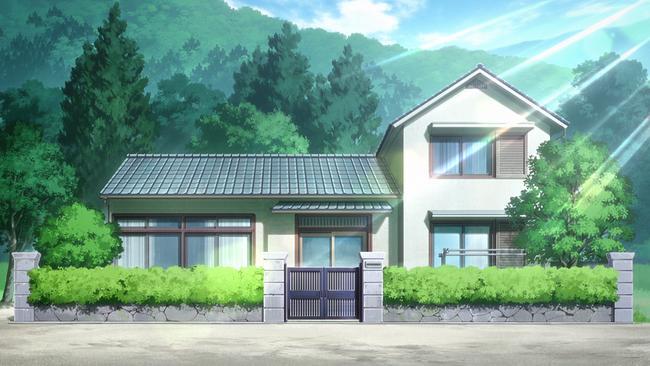
Digimon Survive Review
It’s a classic philosophical query — which matters more, the journey or the destination? If the greatest fictional journey ever written concluded with dreadful disappointment, was it all a waste of time? Like many, I veer toward the belief that journey and destination both matter. What are my thoughts, then, on the story told in Digimon Survive? Is the journey rocky or rad? Do its multiple endings settle the scenario weakly or effectively? And how does its gameplay stack up to the plot-heavy package?
The single loudest chant I've heard surrounding Bandai Namco's latest interactive Digimon adventure has been from fans who didn't expect this game to be a visual novel first and a tactical RPG second. To be frank, I'm surprised. As far as I'm concerned, the marketing established Digimon Survive's visual novel majority just fine. Survive was never billed as another Cyber Sleuth. You either come for the hours-long choice-driven dialogue sequences, punctuated by shorter periods of combat and world exploration, or you reconsider coming at all.
I don't say this on a whim. If there are three pillars to the game — visual novel sequences, battles, and investigative bits — that first pillar is by far the thickest. It carries the burden of holding the whole thing together. If a player isn't captivated by Digimon Survive's story and cast - the option to skip past all the talky stuff is technically there - but they're left with an experience so threadbare that I cannot recommend a purchase.

Here's how it shakes out. Takuma is one of several Japanese middle-schoolers whose class trip goes haywire. They find themselves in a world that's both eerily similar and startlingly dissimilar to our own, inhabited by the eponymous digital monsters called Digimon. Shenanigans ensue, each student gets a partner Digimon, and your role as Takuma is to navigate the emotional tides of an understandably uneasy group of kids trapped in a dimension where all sorts of bad things can happen per your actions. Including, yes, actual death.
That's a solid hook for an opening premise. As far as the character cast goes, Takuma's fellow students range from excellent, to underwhelming, to downright tedious, but hey, at least there's Aoi. She's great. The character writing fares better with the personalities imbued in the partner Digimon, as well as the various monstrous enemies and allies that pepper the setting.
Unfortunately, even the strongest hooks can grow untethered with time. You may have already heard that Digimon Survive features three primary routes that branch off from a (relatively) linear path around two-thirds of the way into the tale. You might also be aware that the route you'll stroll down is dictated by whether you have accumulated a heftier sum of Moral, Wrath, or Harmony points in the dozen-odd hours leading up to the split. It's a decent enough branching narrative approach. But it's let down almost entirely by the most significant flaw a story can have: it just isn't all that interesting.

The initial sense of mystery, and even the much-hyped darker vibe, wear off with the passage of time. Yes, your interactions with the characters can build affinity and potentially prevent them from meeting fatal ends. And yes, those three paths can and will spell glory for some of Takuma's friends and doom for others. There are even scattered moments that tug at my heartstrings. But the themes, the ideas, and the messily translated script wither into tedium and all-too-familiar cliché-ridden blandness.
Things pick back up a bit toward the conclusion of each of the three routes, but it's never enough for me to shake the sensation that I had just experienced something mediocre. Is there a fourth route? A so-called 'golden' route? You can look that answer up online in approximately two seconds, so I'll refrain from confirming or denying it. All I can tell you is that I had checked out every time before events came to a close.
I'm sure some readers may say that's a 'me' thing, and I can't possibly deny it. But I've played far longer visual novels (which isn't to say this game is short, for the record) and it's rare to feel my attention waver to this degree. Despite the initially compelling premise, the plot here is weaker than it first appears, and there's frustratingly little progress by way of genuine character development. This analysis is 100% a 'me' thing. But also, that's kind of how reviews work.

On a brighter note, I adore Digimon Survive's art design. Locations are rich and vibrant. Characters and Digimon are well-realized. It's a lovely-looking game. Maybe not so much during battles, but the delightful soundtrack from Tomoki Miyoshi maintains its welcome stay both on and off the field.
Speaking of battles, it's past time I addressed that other big part of Digimon Survive. To be clear, it's dwarfed in size by the story sections, but chapters are generally capped off with climactic combat clashes. There are smaller-scale fights as well, plus a handy free mode that permits grinding and Digimon recruitment.
Combat in Digimon Survive is fine. That's the four-letter long and short of it. Comparisons to games like Final Fantasy Tactics, Tactics Ogre: Let Us Cling Together, and the Fire Emblem series are inevitable, so here's the verdict on that score. Digimon Survive's spin on the old tactical turn-based formula is like a distilled version of all of the above.
You'll never come out of a conflict breathless and amazed by anything the battle mechanics have to offer. Position your Digimon well, use special attacks when the opportunities present themselves, and evolve your cute non-human friends when it feels most appropriate to do so. Partner Digimon revert back to Rookie form once you've run out of points to keep them on the rampage, so try to time things well for maximum damage output while their mighty powers are on tap.

The evolutions available to Takuma's Agumon during fights are determined by the karma he currently commands; different evolutionary paths will progress depending upon whether Moral, Wrath, or Harmony is highest.
As for recruiting other Digimon, the process plays out like a somewhat unpolished version of Shin Megami Tensei's famous devil negotiation mechanic. You're asked questions by the prospective foe-turned-friend. Answer them all correctly and the Digimon may or may not join your roster. Indeed, it's never a guarantee, and that can be rather frustrating.
At this point, I'd like to circle back to the choices that can be made throughout the story. Since they directly affect Takuma's measure of closeness to the rest of the cast, as well as the direction that the plot takes over time, I'm not thrilled that you can always tell whether an option is Moral, Wrath, or Harmony because they're always listed in exact order. It's very Mass Effect, and this was never one of Mass Effect's better elements. Because it is set up this way, the player doesn't really need to consider anything in any of these dialogue choices other than the pre-determined route they would like to take.
Creating a game that's three parts visual novel and one part tactical RPG was a bold endeavor on Bandai Namco's part, and I salute them for trying. Digimon Survive's got a great aesthetic, and the overall package has its moments. Digimon diehards like me will cheer when our favorite pals pop up, because why wouldn't we? It's too bad it's all let down by shoddy overall execution. Thus, I have my answer on the whole journey-versus-destination debate; I'm not in love with either here. Stronger writing and battle refinement might someday churn out a very special sequel. In the meantime, I wouldn't go so far as to say I feel as cold as Jeri Katou did at the tail end of Digimon Tamers, but I'm hardly Marcus Damon itching to jump back into the ring, either. I guess that makes me Yamato "Matt" Ishida — plainly apathetic.